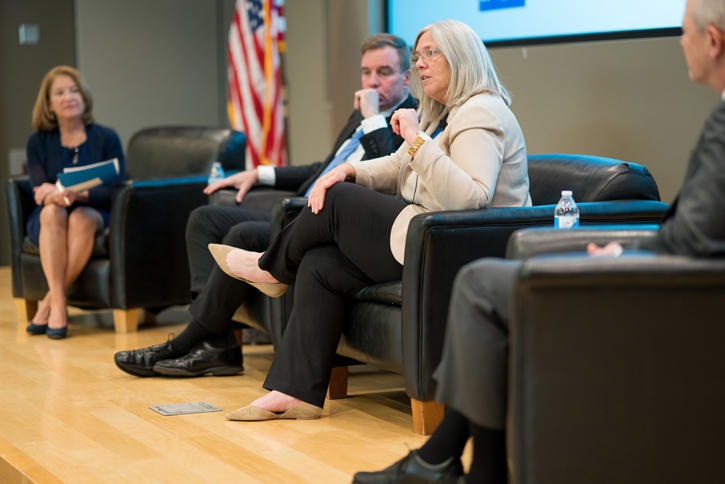The latest White House debate over security clearance reform was brought to George Mason University’s Arlington Campus on Tuesday when senior officials from Congress, the executive branch, and government contracting participated in a panel discussion organized by Mason’s National Security Institute and the Intelligence and National Security Alliance.
“That is a national security problem,” said U.S. Sen. Mark Warner, referring to the current background-check backlog on 600,000 security clearances, “by not attracting the best talent possible because people cannot—from a career choice, and frankly, even from an affordability choice—have that long to wait.”
Warner was joined by Sue Gordon, principal deputy director of national intelligence, Kevin Phillips, CEO and president of ManTech, and Letitia Long, former director of the National Geospatial-Intelligence Agency. All agreed on the need for government-wide standards of trust.

The nation’s 17 intelligence agencies lack uniform standards, which contributes to the backlog. Government-wide standards would reduce the number of investigations needed when talent moves from one agency to another or advances in their career.
Gordon said that the government aims to have this backlog halved by the spring,
“What we have to get better at is the accountability for following the standards and then the understanding of why it is that they’re not,” she said.
“Volume, velocity, and security have to be of equal weight in getting the talent needed to support national security,” said Phillips. “If we don’t include all of those, we will not defend against the risks outside of our nation because we’re focused on the risks inside of our own walls.”
Warner proposed that 90 percent of secret clearances should be completed in 30 days, with top-secret clearances done in 90 days.
“Unless we can do clearance reform with vigorous and real reciprocity [between contractors and agencies], we’re just pushing the rock up the hill,” he said.
